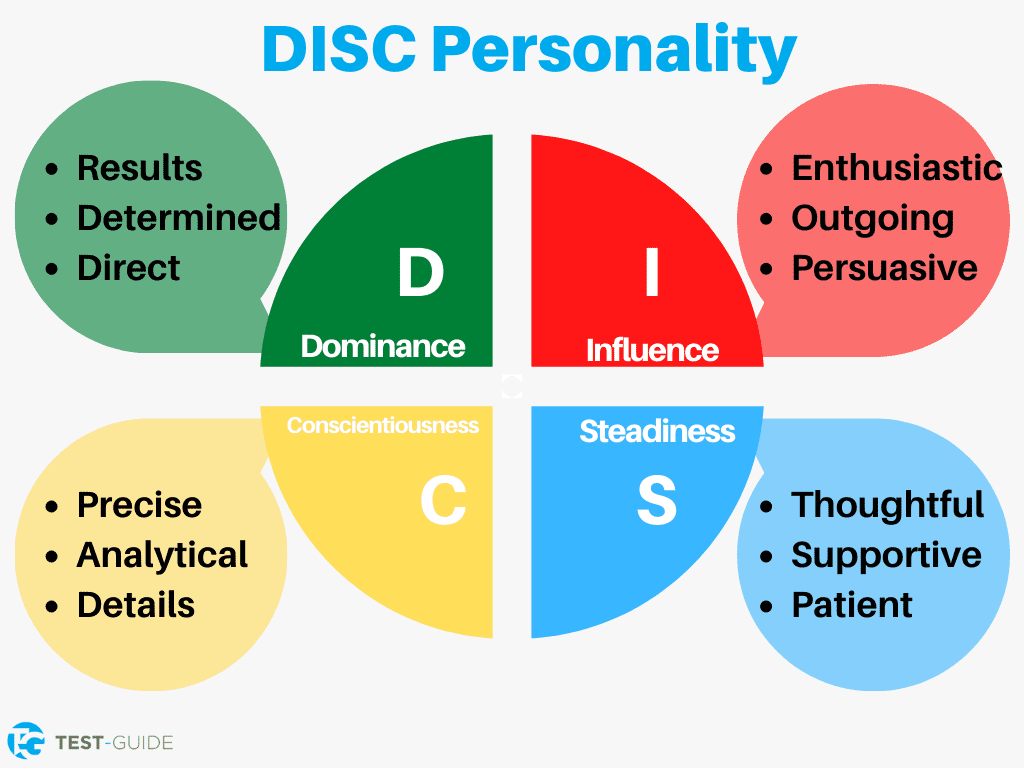Take our DISC personality test to find out more about your personality type.
Our exam is 100% free and requires no registration. You will get your test results instantly after finishing the exam!
Free DISC Test
Take our 16 question DISC test and learn more about your personality profile.
What is the DISC Personality Test?
A DISC personality test is a type of personality exam that can help people better understand their personality style.
A DISC test has no right or wrong answers and should be answered as honestly as possible for the most accurate results.
Example Question:
I put people under pressure
- Disagree
- Slightly Disagree
- Neutral
- Slightly Agree
- Agree
DISC Profile
DISC is short for the 4 DISC factors that are given as a result of taking a DISC personality test. The 4 factors given during a DISC profile are:
- Dominance
- Influence
- Steadiness
- Conscientiousness
These DISC factors are represented visually as a circular grid that is divided into four quadrants.
After taking our DISC assessment test, you will see your scores for each quadrant. Some scores will be higher, which indicates your most likely personality type.
Dominance is the top left quadrant, followed by influence at the top right, steadiness at the bottom right and conscientiousness at the bottom left.

DISC Personality Descriptions
When taking a DISC assessment, you will be assigned to one of the 4 general quadrants. The 4 quadrants are the 4 DISC factors that we reviewed above (dominance, influence, steadiness, and conscientiousness).
Dominance
The dominant (D) personality measures your directness and your decisiveness. It can also measure personal focus and determination and normally represents someone who is focused on the end result rather than the journey toward a goal.
Influence
The influential (i) personality measures your sociability, and your extraversion to a lesser extent. It deals with charisma, persuasive ability, and the likelihood that someone will look to make connections with others and attempt to be well-liked by a group.
Steadiness
The steadiness (S) personality deals with even-temperedness. Those with the trait are patient or calm when it comes to handling difficult tasks or working for long hours. It’s normally represented by a moderate personality that isn’t given to bold or aggressive actions or statements.
Conscientiousness
The conscientiousness (C) personality looks at how analytical a person is, particularly when it comes to their attention to detail or their appreciation for orderliness. They tend to be systematic when it comes to tasks or objectives and aren’t very fast-paced.
DISC Personality Combinations
While some individuals may fall specifically under one of the above quadrants (dominance, influence, steadiness, or conscientiousness), many individuals will be a combination of 2 DISC personalities.
We have listed some common DISC personality combinations (and standalone types) in the table below.
| Personality Combination | What It Means |
|---|---|
| Dominance and Influence (Di) | Results-oriented, vocal, and enthusiastic. |
| Dominance and Conscientiousness (DC) | Diligent, tough-minded, and creative. |
| Influence and Dominance (iD) | High-energy, charismatic, and adventurous. |
| Influence and Steadiness (iS) | Warm, friendly, and sociable. |
| Steadiness and Influence (Si) | Generous, approachable, and compassionate |
| Steadiness and Conscientiousness (SC) | Accommodating, patient, and reliable. |
| Conscientiousness and Steadiness (CS) | Cautious, orderly, and precise. |
| Conscientiousness and Dominance (CD) | Skeptical, stubborn, and disciplined. |
| Dominance (D) | Extremely dominant, like control, and very competitive. |
| Influence (i) | Social butterfly, excellent communicators, outgoing and sociable. |
| Steadiness (S) | Extremely patient and supportive, very loyal, not flustered easily. |
| Conscientiousness (C) | Very analytical and measured, attention to detail, and like structure. |
People who score high in one of the 4 categories become a “high” version of that type.
This doesn’t mean that they don’t have any amount of the other personality matrices – just that they lean more towards one.
Please note that everyone is a combination of all four DISC styles. However, most people tend to be one or two styles.
What is the DISC Assessment Used For?
The DISC is an assessment tool primarily used for fun or by companies looking to screen a prospective candidate or do some team-building.
Many people confuse the DISC test for an intelligence test – this is not the case as the DISC personality assessment has no right or wrong answers.
You can use the DISC assessment to change your workplace culture, understand where a miscommunication might be coming from, or understand whether someone would be good for a new position at your company or organization.
The DISC assessment is sometimes used in conjunction with the Wonderlic test during the hiring process.
Other Personality Tests
If you already took our free DISC assessment, you can take one of our other personality exams:
Frequently Asked Questions
How many questions is your DISC assessment?
Our assessment is 16 questions long.
How long does your DISC assessment take?
Our assessment should take about 5 minutes.
What are the 4 DISC types?
- Dominance
- Influence
- Steadiness
- Conscientiousness
How accurate is the DISC personality test?
The DISC model is only accurate if you answer the questions honestly and truthfully. There are no right or wrong answers. It is important to answer the questions as honestly as possible so you can receive accurate results.
The best way to ensure you get the most accurate results is to take the DISC assessment multiple times over an extended period of time.
Which DISC personality style is the best?
There is not one specific DISC personality that is considered the best. While some people may consider certain personalities to be more desirable, there is not a “best” DISC personality.
Where do you take the DISC personality exam?
You can take our free DISC test online. We listed the assessment above.
Many individuals will take a DISC profile through their employer or during the hiring process.

